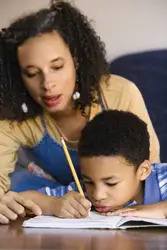 The other day I was at the ice-skating rink dropping off my daughter for her figure skating lesson and I saw a young girl-about 8 years old-come off the ice in tears.
The other day I was at the ice-skating rink dropping off my daughter for her figure skating lesson and I saw a young girl-about 8 years old-come off the ice in tears.
“I can’t do it!” she cried to her mother, who was watching closely from the sidelines, holding an infant. “I’ve tried and tried and I keep falling!”
“I’ve been watching, and you have been trying hard,” replied the mother, wiping away her daughter’s tears. “But if you give up now-just before you get it-you’ll never learn to skate! Even the best skaters in the world fall. In fact, the only way you learn anything is by making mistakes and continuing to try and try! So now, go back out on the ice and try again. I’m going to watch you and I bet this time you will fall even less than you did before.”
As the little girl went back out onto the ice, waving to her mom and baby brother, I felt like jumping up and cheering for that mother!
She had just taught her child one of life’s most important lessons: Don’t give up on yourself!
There are many opportunities to teach your child this lesson, but it is possible that you will miss them if you don’t look for them. Places to look for opportunities to teach your child not give up on himself include:
- Sports with peers that may be better athletes or with a strict coach
- Difficult homework assignments
- Learning to play a new game or when he is losing round after round
- Learning any new skill like tying laces, throwing a ball, braiding, or making a sandwich
Of course, at times it can be difficult to encourage your child not to give up, especially when the going gets tough. Some kids give up easily-crying, having temper tantrums, or refusing to continue with the activity. Nonetheless, it is especially important to help a child exhibiting these behaviors by encouraging him to try to succeed a little more each time. If you give in to your child’s crying or tantrums, thereby allowing him to give up, you give him the clear message that you don’t think he can succeed. If he thinks you don’t believe in him, he is much less likely to believe in his own success. However, if you show your child that you won’t give in to his negative response and that you will continue to encourage him, despite the possibility of (further) failure, you teach him the powerful lesson that not only do you believe he will ultimately succeed, but that he needs to believe in his own success as well.
With each situation in which your child pushes past the point of frustration and achieves a new accomplishment or learns a new skill, she will feel a great sense of pride, recognizing that each temporary defeat brings her one step closer to success…I won’t give up on myself!
Dr. Susan Bartell is a family psychologist. Her latest book is “Dr. Susan’s Fit and Fun Family Action Plan.” You can learn more about her on her website at www.drsusanbartell.com.



















